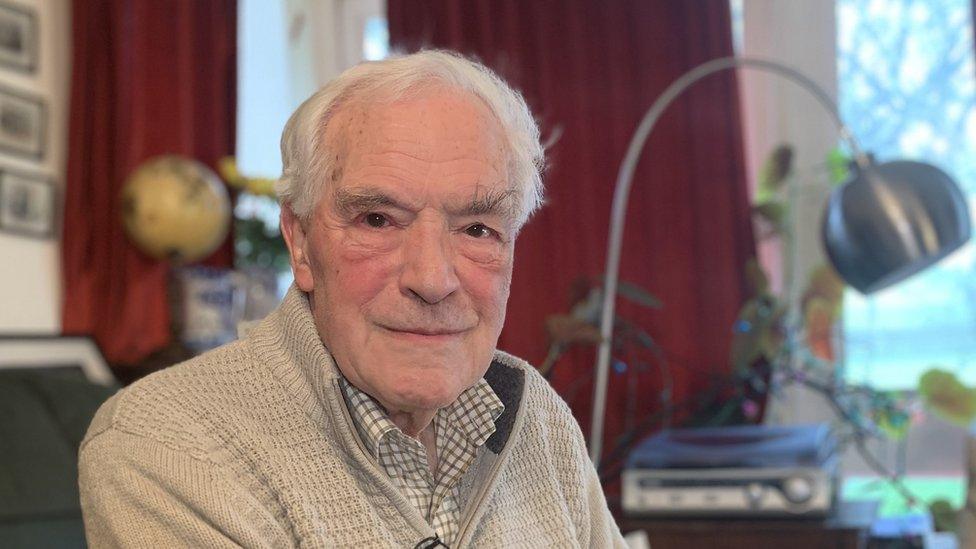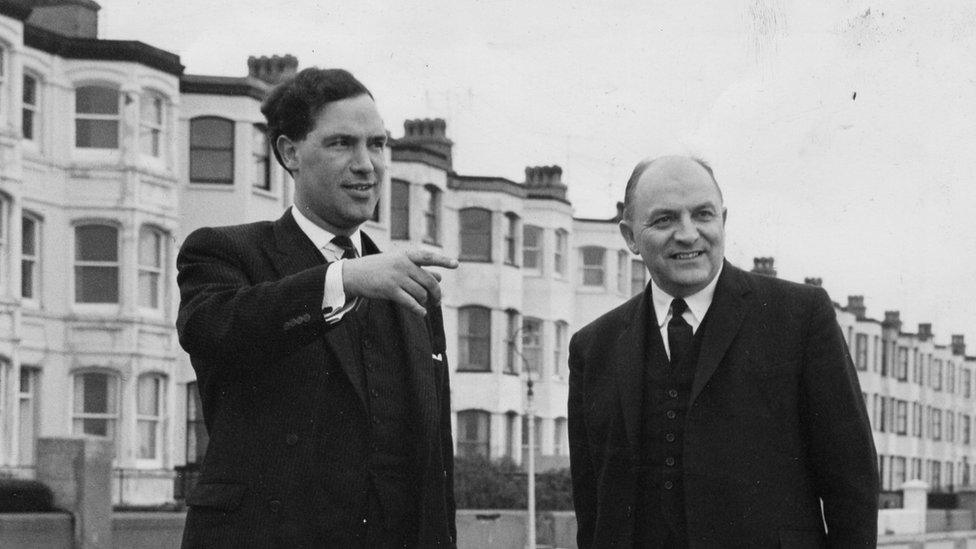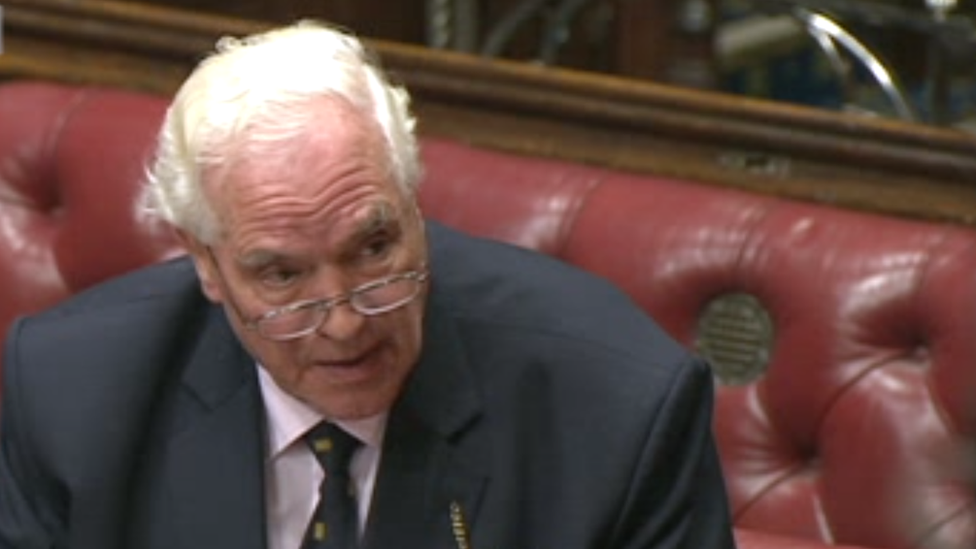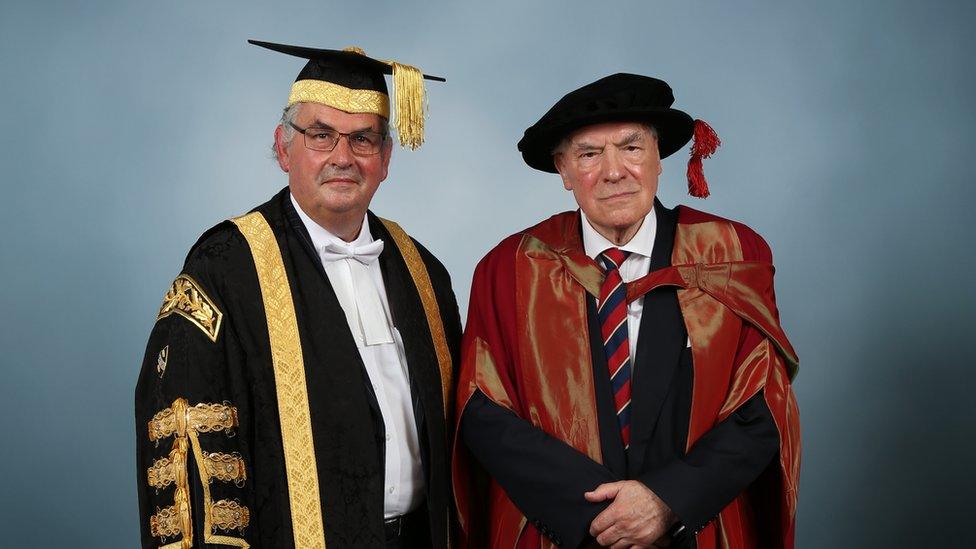Lord Elystan-Morgan, campaigner for Welsh devolution, dies
- Published

Lord Elystan-Morgan became a peer in 1981, and retired in 2020
Lord Elystan-Morgan, who campaigned for a Welsh parliament within two different parties, decades before it came to fruition, has died at the age of 88.
A significant figure in the country's politics, the former Labour MP led the campaign for devolution in 1979.
Born in Pen-y-garn in 1932, his legal work saw him defend two men who tried to stop the Tryweryn valley flooding.
He died peacefully in his sleep with his family at his side on Wednesday morning.
First Minister Mark Drakeford said his "tireless work laid the foundations for the Senedd we have today".
"He had one of the greatest reaches in Welsh political life with a range that goes back to his election in the 1960s," he said.
"He had an enormous breadth of understanding of issues faced by Wales, especially rural Welsh-speaking communities, which he represented."
Former Welsh secretary and attorney general Lord Morris of Aberavon described how he had "lost my greatest friend from my schooldays".
"He was a Cardi, and a great Welshman," the former Aberavon MP and barrister said.

Elystan Morgan (left) contributing to a BBC Wales programme in 1965
"We were on holiday together as two families in Cornwall, when he came up from the beach at lunchtime, with the idea that was completely new to me at the time, for the government to establish a royal commission on the constitution.
"We had both agreed for years that only a Labour government could legislate for Wales to be governed from Cardiff.
"The dream was finally realised, following a turbulous journey in 1979."
Lord Morris said the death of his friend was "a great loss, a Welshman who kept the faith, and I feel the loss deeply today."
Former Plaid Cymru president Lord Wigley said without the campaign for devolution in the 1970s the Welsh Parliament would not have happened.
Ben Lake, Plaid MP for Ceredigion, said he was "a rare figure in the political world: a statesman of intellect and integrity".
Welsh Conservative Senedd leader Andrew RT Davies also paid tribute to a "champion for Cardigan and rural Wales".
Allow X content?
This article contains content provided by X. We ask for your permission before anything is loaded, as they may be using cookies and other technologies. You may want to read X’s cookie policy, external and privacy policy, external before accepting. To view this content choose ‘accept and continue’.

Elystan Morgan was the MP for Cardiganshire for eight years, before he joined the House of Lords as Lord Elystan-Morgan in 1981.
He had studied law in Aberystwyth before working as a solicitor in Wrexham for a decade.
He later became a barrister and a judge, and served as president of the University of Wales, Aberystwyth between 1997 and 2007.
Plaid Cymru
His involvement in politics began in Plaid Cymru, with which he stood as a parliamentary candidate in the Wrexham by-election in 1955, and again in the general election which followed two months later.
He stood there for the third time in the 1959 general election.
As a solicitor, he defended David Walters and David Pritchard, who had tried to stop the flooding of the Tryweryn valley to create a reservoir by damaging equipment on the site. They were fined £50 each.
He stood as a Plaid Cymru candidate in Meirionnydd in 1964.
Dafydd Wigley said Elystan Morgan was "a very prominent figure in Plaid Cymru in the middle of the last century, and Gwynfor Evans saw him as his successor. But things didn't work out and Elystan joined the Labour Party."
In a memoir published in 2012, Elystan Morgan said he had joined Plaid Cymru saying he thought it could win "the sort of majority support in Wales that forced the government of the day... to allow a parliament for the nation.
"By the middle of the '60s it seemed totally obvious that this wouldn't happen in our days."
"It was within Labour therefore that the greatest work was to be done," he went on to say.
Joining Labour
He left Plaid Cymru in August 1965 "feeling wholeheartedly that my political home would be within the Labour Party from then on".
Unexpectedly for him, he was elected Labour MP for Cardiganshire - now known as Ceredigion - in the 1966 general election. He held on to the seat in 1970.
His time in the Commons saw him chair the Parliamentary Labour Party and serve on the Labour front bench, both as a minister in the Home Office and later as an opposition spokesman.

Lord Elystan-Morgan was president of the yes campaign of 1979
Lord Wigley said his big contribution in the late 1960s "was to persuade Jim Callaghan to have a commission on devolution, the Crowther Commission that became the Kilbrandon Commission".
"Their report in 1973 was a backdrop to the new Labour government that came in 1974, and the campaign throughout the '70s to secure assemblies for Scotland and Wales."
The Cardiganshire seat turned Liberal in the election of February 1974, and he tried unsuccessfully to win it back in the second general election of that year.
Devolution
The first referendum on whether Wales should have its own assembly took place on 1 March 1979.
Lord Elystan-Morgan was president of the yes campaign that year, and promoted the cause in many public meetings.
But the campaign was defeated by a majority of four to one. "St David's Day brought its cruel dawn," was how he reflected on it.
Following the campaign Elystan Morgan failed to be elected MP for Anglesey in the 1979 general election.
But Lord Wigley said without the campaigns for assemblies in Wales and Scotland at the time "we wouldn't have secured what we did in the '90s and we wouldn't be now with the parliament for Wales and Scotland".

Lord Elystan-Morgan (right) was awarded an honorary doctorate by the University of Wales Trinity Saint David in July 2017
House of Lords
After Elystan Morgan lost his parliamentary seat, he started working as a barrister in chambers in Cardiff.
He was elevated to the House of Lords in 1981.
He was a member of the Labour front bench and concentrated on legal and constitutional matters until he became a judge in 1987.
"For the next 19 years, politics was exiled completely from my life until I retired from the bench in 2005", he said.
He returned to the House of Lords in 2005 and as a former judge, he sat there as a crossbencher.
There, he paid particular attention to the 2006 Government of Wales Act, which paved the way for a referendum to provide more law making powers for the then National Assembly.
Speaking about his contribution to that debate he said: "If I had done nothing else in my life but that, I would say that it justified what I did [leaving Plaid Cymru and joining Labour]".
He retired from the Lords in February 2020.